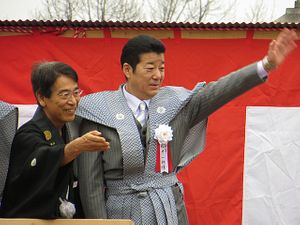In late November, Osaka held gubernatorial and mayoral elections, and a newly reorganized, locally based party, the Osaka Restoration Association (ORA), won both races by defeating candidates backed by the Liberal Democratic Party (LDP), the current dominant party of the national government. Incumbent Governor Ichiro Matsui achieved an overwhelming victory over the challengers and secured a second term. As for the mayoral office, Hirofumi Yoshimura, a former member of the Lower House and hand-picked successor of incumbent Mayor Toru Hashimoto, also won by a wide margin. Throughout the races, the soon-to-retire Hashimoto committed to the campaign actively as party leader.
The major issue contested in the elections was the so-called Osaka Metropolis Plan, which aims to restructure existing prefectural and municipal administrations, eventually transforming the prefecture into another metropolis like Tokyo. The plan had been the core policy of the ORA’s current members, although part of it had been rejected by a municipal referendum held in May 2015. The main focus of the elections, therefore, was this local agenda: whether or not to pursue the plan further under the ORA’s governorship and mayorship, with the understanding that this result could greatly influence politics not only in Osaka but also throughout the national political landscape, particularly in the realm of national security.
These two races were crucial for ORA’s future survival and Hashimoto’s potential influence in the national political arena. Besides the recent rejection of part of the Osaka Metropolis Plan by referendum, the ORA’s split from the Japan Innovation Party just a month before the elections could have worked against ORA’s popularity. Therefore, this double victory was all the more critical to the party and Hashimoto, and it will likely revive the party and the mayor’s allies in national parliament.
While the defeat was clearly disastrous for the Osaka chapter of the LDP, it is likely positive for Prime Minister Shinzo Abe, counterintuitive though this might sound. Although revising the constitution to widen the potential operations of the Self-Defense Forces (SDF) overseas has been at the top of Abe’s agenda, the hurdles of a two-thirds majority in both houses (required to hold a national referendum to approve the revision) have been tough for the administration to clear. Thus, from the prime minister’s perspective, a potential partner in forming a two-thirds majority is welcome. Meanwhile, both Hashimoto and Matsui have had close ties with the current administration for years, often expressing their support for the prime minister’s stance on the constitution. As support from the central government is indispensable to implement the Osaka Metropolis Plan, they have good reason to cooperate with Abe in the area of national security.
Given the upcoming elections for the Upper House next July and possible elections in the Lower House, the rise of the ORA might result in a two-thirds majority for consisting of current LDP–Komeito ruling coalition, the ORA, and other members who support the revision of the constitution. More importantly, increasing the number of ORA seats could erode the bargaining power of Komeito, the junior partner in the ruling coalition, which has expressed reservations regarding constitutional reform.
As ORA’s prime focus is the implementation of the Osaka Metropolis Plan, the party’s detailed stance on national security has yet to be revealed. However, it will likely take a pro-administration position – as a result of the ORA’s split from the Japan Innovation Party, which pursued an anti-LDP line rather than government cooperation – particularly regarding the revision of the constitution. Moreover, as the ORA is urban based and has pragmatist tendencies, the party’s practical approach might change the course of national security discussions, which have tended to be swamped by dogmatic and ideological discourse. Thus, the rise of the ORA may not only form a potential alliance with Abe’s administration but also create room for a more substantive debate about national security, potentially changing the direction of Japanese security policy in the long run.
Michio Ueda is a Fulbright scholar and MA candidate in Southeast Asian Studies at the University of Wisconsin-Madison. He worked in Japan’s Ministry of Defense before coming to the U.S. As a political scientist, his main focus has been the party politics and elections in Southeast Asian and East Asian countries. Michio received his LL. B. from the University of Tokyo.

































